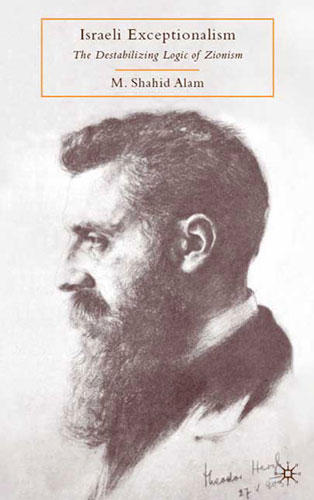M. Shahid Alam shares with us an excerpt from his recent book, Israeli Exceptionalism
excerpted from the author’s Israeli Exceptionalism (Palgrave, 2009)
“We do not fit the general pattern of humanity…”
David Ben-Gurion
“…only God could have created a people so special as the Jewish people.”
Gideon Levy
The fecundity of the Zionist project in producing claims of exceptionalism is not in doubt. Anyone who scans the voluminous Zionist literature will be suitably impressed by its repeated resort to claims of Jewish and Israeli exceptionalism. There is scarcely any aspect of Israeli or Jewish history that has not been embellished with some claim to uniqueness.
Israeli exceptionalism has many uses. It defends, obscures, explains away the ‘abnormal’ character of the Zionist nationalist project. When the Irish sought national liberation, their goal was straightforward. They wanted to regain national control over their lives and their country from a foreign power. No one had to convince the Irish that they are descended from the gods; that they possessed a unique essence which set them apart from all other peoples; or that their history, religion, race, language, morality or culture set them above their colonial masters. Occasionally, driven by exuberance or hubris, nationalists have advanced exceptionalist claims, but the success of their movement has not depended on their acceptance. The Irish claimed sovereignty because they knew that they are a nation with their own territory. In order to create their own state, they did not have to establish that they are exceptional.
The Zionists confronted two handicaps that Irish nationalists did not face. The diverse and scattered Jewish communities of Europe – and even more so, the world – did not constitute a single people. Instead, the Jews of the world were loosely united by their religious heritage, but they shared their languages, cultures and genes with their neighboring communities. Moreover, no Jewish community had its own country, a substantial and contiguous territory where it formed a majority of the population. Despite these twin Jewish deficits – the absence of a nation and a national territory – the Zionists were determined to ‘liberate’ the Jews of Europe and endow them with their own state.
The Zionists would remedy the first deficit by denying its existence. They knew that the Jews were not a nation, but it would be unwise to begin their ‘nationalist’ movement with the admission that a Jewish nation did not yet exist. They also did not think that this deficit was a serious hindrance to their movement. With help from anti-Semites, whose attacks had been growing in recent decades, the Zionists were convinced that they could quickly convince enough frightened Jews that they are a nation. Instead of constructing a nationalism based on a common religion, however, the Zionists chose to cultivate a racial basis for Jewish nationalism. They embraced the anti-Semitic accusation that Jews of Europe are an alien race, not Germans or Russians, descended from the ancient Hebrews.
A racial identity offered the best hope of inculcating nationalism in culturally diverse Jewish communities. Only an identity, based on the myth of a common descent, could unite peoples who were as different ethnically and culturally as the Jews of Portugal, Britain, Germany, Greece and Russia. Only the myth of racial unity, only the conviction that they are a single family, descended from Abraham and Jacob, could unite orthodox, conservative and reform Jews into a nation. Once the Jews were convinced of their racial identity, preserved over hundreds of generations in exile, this would also endow them with pride in their ancient pedigree and their unique ability to survive and preserve their racial purity through difficult conditions. This was sure to engender a strong sense of their distinctiveness, superiority and destiny, rooted in Jewish traditions and the Jewish Bible. With confidence, the Jews could see themselves as a unique nation, both ancient and divinely blessed.
The Zionists were more candid about their ‘land deficit;’ this was not something they could fudge. Indeed, their land deficit defined the ‘abnormal’ condition of Jews; they were an abnormal people because they did not have a country they could call their own. Conceptually, the land deficit was easier to fix. The Jews only had to stake a claim to Palestine as their country: there were two ways of doing this. Jews of secular persuasion could claim that they had a historical right to Palestine, since they were descended from the ancient Israelites. In addition, it would be easy to reclaim this land because – according to early Zionist rhetoric – ‘this was a land without a people.’ No one had claimed Palestine during their absence. The religious Jews had a simpler and – for them – more irrefutable claim. Their God had promised the land to their ancestors for keeps. All they had to do was invoke their divine right to this Promised Land.
It turns out, after all, that the Jews are a people with their own land. Once the Zionists had made their case, there would be nothing abnormal about their national project. This was the official rhetoric of the Zionist project of national liberation for the Jewish people. On the back of this rhetoric, the Zionists would succeed in convincing the Western world to support their exclusionary colonial project in the Middle East.
M. Shahid Alam is a professor of economics at Northeastern University. Israeli Exceptionalism can be ordered from Amazon.com




 © 2026 All Rights Reserved
© 2026 All Rights Reserved